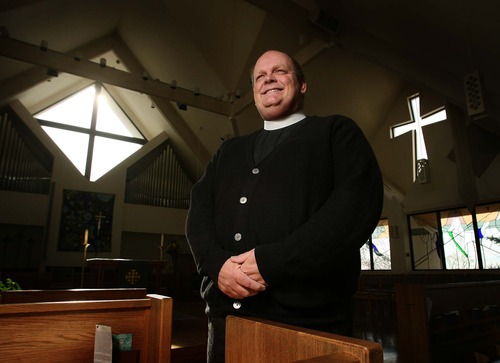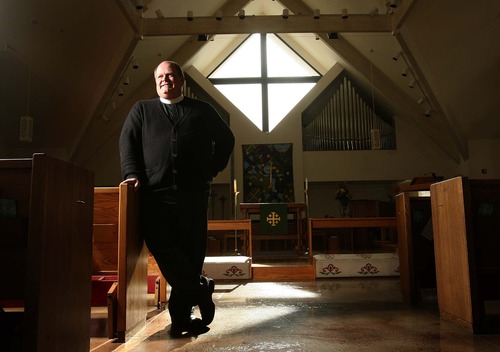This is an archived article that was published on sltrib.com in 2012, and information in the article may be outdated. It is provided only for personal research purposes and may not be reprinted.
The Rev. Michael Mayor knows what some people might think when he earnestly says that he spent two weeks drinking his way through Scottish distilleries.
But the 46-year-old priest at Salt Lake City's All Saints Episcopal Church is sincere when he swears that it was a deeply spiritual experience.
After all, at the heart of much Christian worship is a simple meal of bread and, yes, wine — physical elements that become important symbolic or real avenues to godliness.
Even whiskey can have sacramental significance, Mayor discovered last spring, especially to the Scots.
Single malt whiskey was invented by Scottish monks, he learned. Distilled alcohol is known as "spirits," while the portion that evaporates in the process is called the "angel's share."
Even though all the whiskeys were made from the same ingredients, every sample smelled and tasted like the region where it was made, he says. It became the "embodiment and expression of the place, a vehicle for making deep connections with the people."
Though startling insights, these were not the ideas Mayor had anticipated learning during his eight-week sabbatical in the British Isles. But they were part of the enhanced faith he brought back to Utah, evidence of an expansive view of his past and future.
He also brought a bundle of self-awareness.
—
Needing renewal • The would-be priest was born in Maryland but grew up in Southern California, where his father was a career naval aviator. Though his mother belonged to a Free Will Pentecostal church, she agreed to rear young Mike as a Roman Catholic, her husband's faith (though he was not overly devout). As a teen, Mayor switched to the Episcopal Church, drawn to its youth activities.
But his father was an alcoholic, which meant Mayor experienced conflict in his family.
"I am not a deeply wounded person," Mayor says. "But I grew up pretty wired toward understanding life as a struggle. Fighting for what was right was my primary metaphor."
And he carried those notions into his ministry.
Then, after 16 years in his vocation, Mayor needed a change.
"I had reached a point where, in terms of the tasks, there was nothing new under the sun. I was beginning to wonder if that was a vocational crisis. Maybe I should start writing or teaching. Just do something else."
So he went to the University of Cambridge as a visiting scholar to work on a book, to study with great professors, engage with great minds and plot his future.
"I did go to church on occasion," Mayor writes in a summary of his experience, "but focused more on exploring the dimensions of my personal and professional self that often do not get attention because of the demands of being a rector."
The Cambridge experience was intellectually rigorous and invigorating, but he found himself being drawn again and again into the role of priest.
"I formed a few friendships with peers over there," Mayor says, "and within a week or two, we would end up having a pastoral conversation. They would provide information about their lives, and I would offer some kind of counseling. It happened naturally, organically."
And there was Mayor's "aha" moment — he is inescapably a priest. It is an essential part of his self.
He could be a teacher at a university or an author, but this ministering would never go away.
Maybe novelty or finding something new to do wasn't the point, Mayor reasoned while on this journey of self-discovery. Maybe it was less about whether to be a priest and more about how to be a priest.
What if grace, rather than struggle, was his defining metaphor?
—
Back to the future • Though he was delighted with Britain's every cathedral, museum and lush landscape, the experience made Mayor more alert to American beauty, accents and religiosity.
"Britain is a much more secular society than we are," he says. "There's a lot of spirituality still nascent in our U.S. culture. That's not an indictment of English culture, just a noticeable difference."
He was also happy to return to his wife, Liana, their 7-year-old son, Justin, and the 380 members of All Saints, where next month he will celebrate his 10th anniversary as their rector.
He has finished the book, tentatively titled The Five Sutras of Jesus: Discovering the Christ the Church Forgot, that he spent his sabbatical writing.
While in England, Mayor writes in his sabbatical report to the congregation, he moved from seeing himself as a "hero/warrior to wisdom seeker."
A hero/warrior is focused on winning battles through self-sacrifice and championing others, he writes, while a wisdom seeker "is focused on the mystery of life, and seeks to embrace what is and to find the wisdom that the divine has to offer in all of life."
The hero/warrior model may have worked to solve congregational problems, but sometimes at the cost of pastoral care and recognizing the "creativity and positive energy" amid trials.
Through his sabbatical experience, the All Saints rector has "a centeredness and a focus to his ministry that wasn't present before," says the Rev. Michael Jackson, a fellow Utahn and retired United Church of Christ minister who accompanied Mayor on the distillery tour. "He's less caught up in the frenzy of things now that he's had that step back and away from daily ministering. Plus, he's had the discipline of writing, which brings its own perspective."
Mayor has a clearer "focus and calm that really will unfold in the life of this congregation over time," Jackson says. His congregants "will profit from it in so many ways."
Some already have.
"He seems wiser, but also more energized," says Dorothy Weber, who joined All Saints about five years ago. "He brought renewal to the church, many more activities — and an awful lot of joy."
Joy, Mayor now sees, is essential to life, even amid struggles. It needs to be savored, you know, like the Scots relish their simple malt whiskey.





